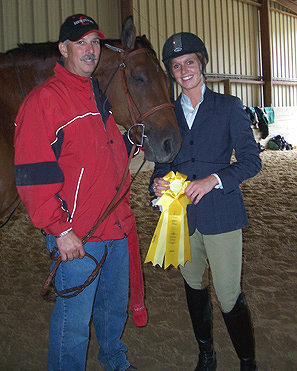|
||||||
|
DEFINITION OF AN EQUESTRIAN ATHLETE Recently the Editor of Campus Equestrian attended an "Equestrian Talent Search" at Mount Holyoke College. At an "ETS" riders who are not yet in college have the opportunity to learn from College Coaches what preparation is needed to ready themselves for college competition. A short schooling show takes place, allowing riders to jump and ride on the flat. A judge offers feedback to riders and their parents a short time later. Equestrian Talent Search organizer (and Xavier University of Ohio IHSA Coach) Jim Arrigon answers questions about College programs, in many cases matching riders to schools with both a solid riding program and a specific major. Among many pieces of literature prospective college riders receive from Arrigon at an ETS is a flyer listing the "Definition of an Equestrian Athlete." In reality this is a series of definitions, serving as both a motivational tool and to prepare future college students to leave their 'attitude' at the door. The Editor was fascinated by these definitions, and after an e-mail to Mitchell received permission to share his list with the public. Created by Cornell University Head Coach Chris Mitchell, the "Definition" is posted on a wall inside the John T. Oxley Center where Cornell practices and hosts shows. The Editor was told that at first the list of definitions was short, but that when a brainstorm occurred it became time to add another definition. As of mid-2010 Mitchell's list was at 14 definitions, still enough to fit on one page. Also as of mid-2010 Mitchell had a run of ten consecutive seasons as overall Reserve High Point Hunter Seat Team in the IHSA's Zone 2, Region 3, ahead of everyone except Skidmore College (the current IHSA National Champion). The Cornell program has been highly successful during the Mitchell era (which includes his wife Martha as the Assistant Coach). Because Chris Mitchell's Cornell program is strictly for women the list of definitions contains the words "she" and "her" throughout. Because the IHSA, IEA, IDA and even those who take part in ETS's are not all-female, Campus Equestrian has choosen to amend the text slightly so that it relates to either sex. The Editor feels that much of what Mitchell has composed are words to live by, at least if you want to succeed in the horse business. "(S)he works hard without complaint because (s)he wants to be the best." "(S)he is strong and fit. (S)he doesn't just ride - (s)he runs, lifts, bikes, swims. Riding or showing one horse per day is nothing - (s)he needs to do more." "(S)he rides anything (s)he can for extra experience. (S)he figures the horse out and makes it better. (S)he is grateful for any opportunity to ride, learn and improve." "(S)he looks at difficulties as challenges and takes them head on. If (s)he fails, (s)he knows why. If (s)he falls off, (s)he climbs back on and tries again." "(S)he doesn't make excuses. (S)he doesn't blame the horse for (his/)her own shortcomings. (S)he owns (his/)her mistakes, and works at improvement." "(S)he has the discipline to work on (his/)her weaknesses even though it is not fun. (S)he works hard without being forced, and uses each ride as a chance to learn." "(S)he makes progress because (s)he works and practices hard and is motivated to improve. (S)he learns new skills every time (s)he rides, and practices them until (his/)her technique is perfect. (S)he knows that 'perfect practice makes perfect'." "(S)he doesn't waste time making the same mistake over and over again. Emotion is not an issue - (S)he is like a machine. (S)he learns from (his/)her mistakes each time (s)he rides, and avoids that mistake in the future." "(S)he doesn't let negative attitude hold her back. (S)he knows that negative attitude impedes (his/)her progress and keeps (him/)her from being a Champion." "(S)he avoids drama and is a good teammate." "(S)he turns frustration into focus, uses failure as fuel in (his/)her quest for success." "(S)he pays attention to detail with everything (s)he does in the barn, from (his/)her outfit and gear to grooming and tacking and caring for (his/)her horse and tack. (S)he knows that everything (s)he does reflects the tradition and discipline of our sport." "(S)he appreciates the skill, commitment and devotion of (his/)her coach and parents, and is grateful for their help because (s)he couldn't do without them." "YOU STOP BEING AVERAGE THE DAY YOU DECIDE TO BE A CHAMPION, BECAUSE THE AVERAGE PERSON DOESN'T DARE MAKE THAT DECISION."
|
||||||
|
|
||||||
|
HOME
| CONTACT US |
||||||

